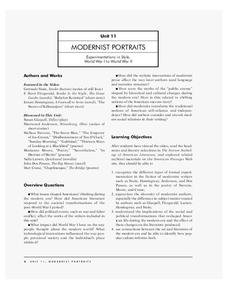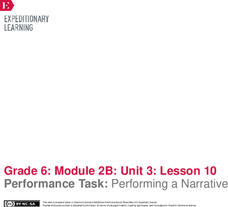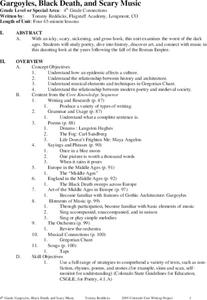EngageNY
Mid-Unit Assessment: Small Group Discussion: How Do Modern Poems Portray Modern Adversities?
How is a poem similar to and different from a news article? Pupils use a graphic organizer to compare and contrast the two genres. Also, as part of a mid-unit assessment, scholars participate in small-group discussions based on poetry...
Annenberg Foundation
Poetry of Liberation
How do writers use words to protest injustice, challenge the status quo, and shape their own identities? Individuals watch and discuss a video, read author biographies, write poetry and journals, develop a slideshow, and complete a...
EngageNY
Analyzing, Comparing, Sharing: Modern Voices
What do modern voices sound like? Scholars explore the topic, reading two concrete poems from John Grandit's Blue Lipstick and analyzing them using a graphic organizer. Next, they read a third poem and work with partners to look for...
EngageNY
Analyzing and Discussing: Modern Voices
This is the way we go to school. Scholars take a look at two poems about different ways to get to school, TyrannosaurBus Rex and Point A to Point B. Pupils work in triads to analyze the poem images and determine the theme.
Annenberg Foundation
Modernist Portraits
How did literature reflect people's attitudes in post-World War I America? A lesson explores the topic using a variety of activities. Individuals watch and respond to a video; read author biographies and engage in discussion; write...
EngageNY
Launching Modern Voices: Concrete Poetry
Challenges are different for today's kids. Learners begin to think about their own challenges by examining the adversities faced by children in medieval villages. They complete a graphic organizer as they watch the...
Annenberg Foundation
Migrant Struggle
The American Dream is a goal that many pursue, but is it truly attainable for all people? An in-depth lesson explores the plight of migrants in twentieth-century America. The resource includes a video and author biographies and...
EngageNY
Performance Task: Performing a Narrative
Calling all performers! Scholars present a modern-day theme of adversity by performing their narratives for the class. As individuals watch their peers, they take notes on each performance using an Audience Note Sheet.
Center for History Education
Speaking Up and Speaking Out: Exploring the Lives of Black Women During the 19th Century
Young historians investigate the often-hidden history of free and enslaved African American women before the Civil War. Using a collection of primary and secondary sources, including speeches, diaries, and poems, they evaluate the often...
Curated OER
The Stranger Redeemed: A Portrait of a Black Poet
Read and analyze poems by African-American authors. Using the text, they identify the various patterns, subjects, language and dialects used. Then team up to compare and contrast the various authors and define new vocabulary. The lesson...
Curated OER
Whitman and Lincoln
Students determine if Lincoln and Whitman ever met and write a dialogue between the two men. In this Whitman and Lincoln lesson, students read Whitman's poem "Beat! Beat! Drums!" and connect it to the events of Lincoln's presidency....
Curated OER
Yours and My Trail of Tears
Students investigate the Trail of Tears. In this United States history lesson, students identify the reason for removing the Cherokee Nation and role play a modern day situation similar to the Indian Removal Act. Students reflect their...
Curated OER
Gargoyles, Black Death, and Scary Music
Students research the Dark Ages using books, the Internet, and other media. In this Dark Ages lesson plan, students study poetry, music, art, and the architecture of the Dark Ages.
Curated OER
In A Station Of The Metro And A Pact
Students are exposed to two different works of poetry in order to complete a task of comparing and contrasting them. They analyze the poem and identify the juxtaposition. The analysis is compiled by them to make a class report of it.
Curated OER
Visit a Historical Site
Students research a historical site and determine the site's historical significance to their community. They research the events surrounding the site and conduct field research in order to examine a certain time period. Students write a...
Curated OER
Read "El Corrido de Gregorio Cortez"Americo Paredes version
Students see examples of other types of written stories. They are introduced to the ballad in literature. Students obtain ideas for their own family story. They discuss how ballads can relate true stories through music. Students discuss...
Curated OER
How Does Ancestry Affect Folklore?
Middle schoolers break into groups of 4 or 5 and choose an option to demonstrate a different cultural perspective in a fairy tale or other folklore that they are familiar. Possible choices are: PowerPoint presentation, video, digital...
Curated OER
Early Jazz
Students gain an understanding of early jazz. They study Dixieland and the Roaring Twenties. They examine the American historical significance and cultural implications of early jazz.
Curated OER
Jazz In America
Students explore the Jazz Era in America not only by answering questions but listening to music as well.
Curated OER
Mystery of the Malformed Frogs Lesson Plan
Students develop an understanding of how students and volunteers can make scientific observations that can aid conservation. They read the account of the Minnesota New Country School project by Ryan Fisher, Mystery of the Malformed...
Curated OER
Famous Firsts Crossword
In this crossword puzzle worksheet, students read the 10 clues about famous firsts for Black history. Students use the words in the word bank to complete the puzzle.
Curated OER
Mimics Survive -- Camouflaged Reptiles
Students examine mimicry as a survival strategy in repiles. They examine examples of the Mexican milksnake and the coralsnake in attempt to distinguish the differences in them. They discuss other species that use mimicry.
Curated OER
Famous Firsts Challenge
In this Black history month worksheet, students read the statements about Black history month. Students select the best answer to complete the 10 statements.
























